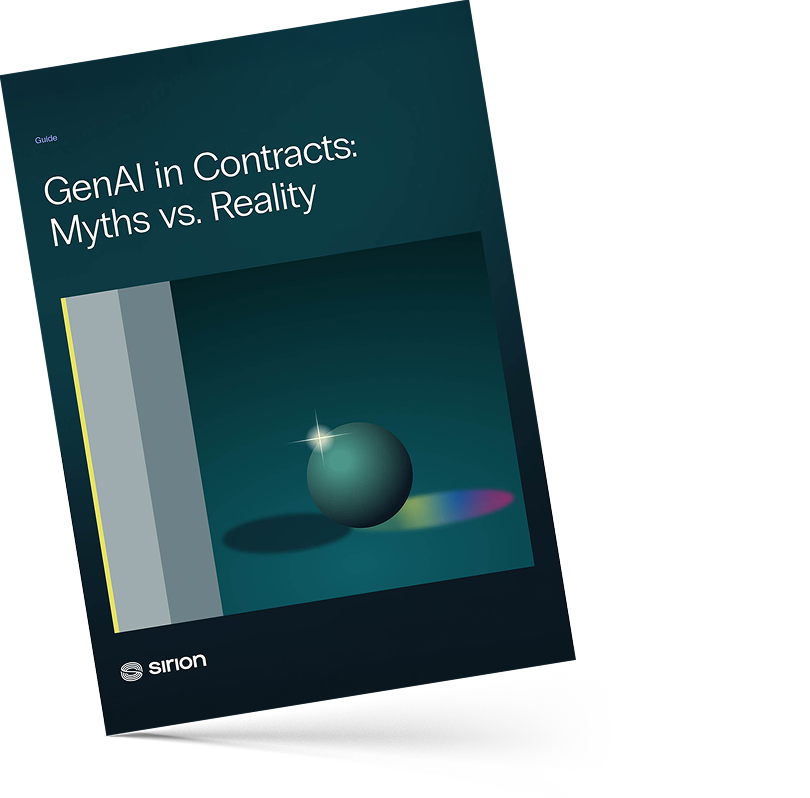20 Important Contract Clauses for Businesses to Know

- Last Updated: Dec 24, 2025
- 8 min read
- Sirion
Always draft every contract with specific goals in mind. Whether your goal is to reduce contract risk, negotiate stronger terms, or protect your intellectual property, the language you use matters. The clauses you include—and how consistently you apply them—can make or break your agreements.
Not including specific, critical clauses can leave your business exposed to unnecessary legal, financial, or operational risks.
What are Clauses in a Contract?
Clauses in a contract are distinct sections or provisions that outline specific terms, conditions, and obligations agreed upon by the parties involved. They ensure clarity, define rights and responsibilities, and mitigate risks in legal agreements. Examples include confidentiality, liability, and termination clauses, all of which serve to protect parties’ interests and provide a framework for resolving potential disputes.
Importance of Clauses in Contract
Including well-crafted clauses of a contract ensures:
- Risk Mitigation: Protects businesses from unforeseen liabilities and conflicts.
- Clarity: Defines precise obligations, avoiding ambiguities in interpretation.
- Compliance: Ensures adherence to laws and regulations.
- Flexibility: Facilitates customization of terms based on business needs.
- Efficiency in Dispute Resolution: Establishes predefined mechanisms to handle disputes, reducing litigation time and costs.
How to Draft Strong Business Contracts
A business contract is a promise between two parties—one agrees to provide services or products, and the other agrees to pay or provide a benefit in return.
The key here is to ensure you’re showing up to the negotiation table with a well-written contract. Without one, you open your enterprise to unnecessary risk—legal, financial, reputational, or otherwise.
Traditional Contract Management Is Holding You Back
Learn how AI-driven CLM transforms legal and procurement in our report: The Value of CLM for Legal and Procurement Teams.

Clauses in contract drafting provide your agreements with extra layers of protection. While business needs vary by industry, location, and goals, a few important contract clauses will always work in your favor if executed properly.
Keep reading to see what essential clauses of a contract you can’t afford to skip enterprise-level agreements.
The Top 20 Most Important Contract Clauses
1. Confidentiality Clause
A confidentiality clause requires one or more contracted parties to protect sensitive data. You’ll use this standard contract clause to define what information needs to be kept private from competitors, the public, and other applicable third parties.
2. Indemnification Clause
Indemnification clauses clearly outline how one party will compensate the other if certain events cause them to experience a loss or damages. By enforcing the clause, the indemnifying party is responsible for ensuring the indemnified party does not experience future financial harm. This typically means covering the costs associated with the loss.
3. Force Majeure Clause
A force majeure clause covers unforeseen circumstances that would prevent a party from fulfilling its contract obligations. Remember that drafting a force majeure declaration response needs to be done carefully and within a specific timeframe. Be sure to have processes in place to quickly address these events and avoid further complications.
4. Dispute Resolution Clause
Dispute resolution clauses define the avenues parties will take to resolve any disputes that arise during the contract’s term. By proactively outlining how parties will approach disputes and who will be involved in the resolution process, this clause gives everyone more control in efficiently addressing these proceedings.
5. Arbitration Clause
Arbitration clauses require parties to arbitrate any disputes related to a contract. This means you and your counterparty will present your respective evidence to a neutral third party who will make a legally binding decision on how to resolve your conflict.
6. Termination Clause
Termination clauses define the specific circumstances under which a party can terminate an existing contract. As long as the agreed-upon conditions apply, this clause allows one or both parties to end the contract without being liable for fulfilling the contract’s obligations.
Some essential types of termination clauses include:
- Termination for Convenience: Allows termination without cause under agreed conditions.
- Termination for Breach: Permits termination if one party fails to uphold obligations.
- Mutual Agreement Termination: Ends the contract when both parties agree to discontinue it.
7. Jurisdiction Clause
A jurisdiction clause specifies which governing bodies have the power to address contract disputes and handle resolution measures. Including this in your contracts is particularly important if parties complete project work in different geographical zones.
8. Privacy Clause
Not to be confused with confidentiality clauses, privacy clauses cover how parties collect, use, and store a person’s data. You must include these clauses in business contracts to comply with privacy regulations like GDPR.
9. Warranty and Disclaimer Clause
This clause protects your business by informing consumers your company doesn’t accept liability for problems with services or products. You can also use a warranty and disclaimer clause to notify buyers of post-purchase limitations.
10. Damages Clause
A damages clause lays out how parties will calculate and pay damages in the event of a breach of contract. This can include actual or liquidated damages, depending on how you negotiate the contract.
11. Payment Clause
Establishes payment terms, including timelines, methods, and penalties for delays. Clear terms ensure timely transactions and reduce financial disputes.
12. Severability Clause
States that if one part of the contract is invalidated, the rest remains enforceable. This ensures the agreement’s continuity despite minor legal issues.
13. Subcontracting Clause
Specifies conditions under which parties can delegate responsibilities to third parties. It safeguards the quality and confidentiality of services.
14. Non-Compete Clause
Restricts one party from engaging in competing activities for a specified time and location post-contract. This protects businesses from unfair competition.
15. Penalty Clause
Sets penalties for breaches, incentivizing parties to comply with terms. It serves as a deterrent and provides financial remedies.
16. Statute of Limitations Clause
Limits the time parties have to initiate legal action for breaches. This prevents prolonged liabilities and ensures timely dispute resolution.
17. Change Control Clause
Outlines procedures for making modifications to the contract. It ensures all changes are mutually agreed upon and documented.
18. Choice of Law Clause
Determines which jurisdiction’s laws apply to the agreement. This is critical in international contracts to manage legal complexities.
19. Conflicts of Interest Clause
Prevents actions that may compromise the integrity of the agreement due to conflicting personal or professional interests. This builds transparency and trust.
20. Data Protection and Privacy Clause
Focuses on the secure handling of sensitive business and personal data, ensuring compliance with relevant data protection laws and standards.
Critical Drafting Considerations (For All Contract Clauses)
Regardless of the clause type, keep these drafting fundamentals in mind:
1. Be Clear and Unambiguous
Avoid vague terms like “reasonable time.” Use specific, measurable language.
Example: Say “Payment within 15 days of invoice receipt” instead of “Prompt payment.”
2. Align with Business Goals
Each contract clause should serve your business’s strategic interests—protecting data, accelerating cash flow, reducing liability, etc.
Example: A SaaS provider might prioritize strong data security and uptime clauses.
3. Plan for the Future
Account for worst-case scenarios: breaches, early exits, force majeure events.
Example: Make sure your force majeure clause reflects risks relevant to your geography or industry.
4. Ensure Clause Harmony
Clauses don’t exist in isolation. If your termination clause conflicts with your payment terms, you’re asking for trouble.
Clause Review Checklist
Before finalizing any clause, it is essential to conduct a systematic review to ensure the provision is clear, enforceable, and aligned with the overall contract strategy. The checklist below provides key criteria to evaluate the effectiveness and reliability of every clause:
| Item | Question to Ask |
| Clarity | Is the meaning unambiguous? |
| Relevance | Does it support the deal’s purpose? |
| Enforceability | Will it hold up in arbitration or court? |
| Compliance | Are regulations or legal standards addressed? |
| Risk Protection | Does it minimize business exposure? |
| Consistency | Does it align with other clauses? |
| Mutuality | Is the obligation or restriction fairly balanced? |
Building a Foundation: Best Practices for Contract Clause Management
Mastering individual contract clauses is vital, but it happens most effectively within a robust overall contract management process. Key best practices include:
- Developing Clause Libraries: Creating pre-approved, standardized language for common clauses ensures consistency, reduces drafting time, and incorporates legal and business standards.
- Establishing Contract Playbooks: Documenting standard positions, fallback options, and negotiation thresholds for key clauses guides negotiators and ensures alignment with company policy.
- Ensuring Cross-Functional Collaboration: Involving legal, procurement, finance, IT, and relevant business units in the review process ensures all perspectives and risks are considered.
- Maintaining Version Control: Rigorously tracking changes during negotiation prevents confusion and ensures the final executed version accurately reflects the agreed terms.
How Artificial Intelligence Plays Role in Contract Clauses
Manually creating and managing new contracts for every business deal can be tedious and bog down legal teams.
Generative AI creates greater value at every step of the contract lifecycle. By combining this technology with your CLM tool, you can:
- Expand Data Accessibility via an Intelligent Contract Repository – GenAI gives the appropriate parties across your enterprise visibility into deep contract clauses meaning and insights in a single, secure location.
- Streamline Contract Drafting – A CLM with data trained on multiple LLMs automatically delivers company-preferred boilerplate clauses in a contract to first-draft contracts for stronger business outcomes.
- Identify Contract Risk Automatically – Properly trained AI instantly highlights missing or problematic clauses of a contract and offers rule-based suggestions to improve contract risk management.
- Make Negotiations Seamless – Generative AI learns your risk playbook to immediately flag important clauses in a contract and offer precise redlines to improve overall contact negotiations.
- Reduce Time Spent on Reporting – GenAI expedites contract management by improving how you search for and analyze insights from clauses in a contract, simplifying reporting processes.
Rethink How You Manage Contracts
Learn how GenAI is reshaping contract creation, execution, and analysis in GenAI in Contract Management: Myths vs. Reality.

Elevate Clause & Contract Creation With Smart Contracting Tools
When drafting new business agreements, every detail matters. The last thing you want is to realize you’re missing an important contract clause after a problem arises. Paying attention to each clause can save you from potential contract issues.
Sirion’s Contract AI suite protects your business. It reduces contract risk by instantly identifying missing standard contract clauses, suggesting business-approved language, and leveraging historical data to improve every contract you draft moving forward.
See how you can get the advanced contract intelligence you deserve to help standardize your contract clauses and create better contracts.
Frequently Asked Questions
How often should contract clauses be reviewed or updated?
Contract clauses should be reviewed at least annually or whenever there is a significant change in laws, business strategy, or operational risk. Regulatory shifts (e.g., new data privacy laws) or market conditions (e.g., supply chain instability) can make previously standard clauses outdated or insufficient.
Who should be involved in drafting and reviewing contract clauses?
While legal teams typically lead contract clause drafting, input from finance, procurement, operations, and IT is essential. Cross-functional collaboration ensures that clauses address legal risks as well as commercial, technical, and compliance concerns.
What are some signs that a contract clause might be problematic?
Red flags include vague language, inconsistent terminology across the document, overly aggressive terms that could stall negotiations, or one-sided obligations without mutual benefits. These are often the clauses that lead to disputes or bottlenecks during enforcement.
Can using too many contracts clauses backfire in negotiations?
Yes. Overloading a contract with excessive or overly rigid clauses can make agreements harder to close. Balance is key—include only clauses that are relevant to the transaction’s size, scope, and risk level.
How do international contracts affect clause drafting?
Cross-border agreements introduce additional complexity—such as differing legal systems, enforceability rules, currency risks, and data protection requirements. Clauses like jurisdiction, choice of law, and dispute resolution become even more critical in these contexts.
What tools can help automate or simplify clause management?
Contract lifecycle management systems with AI capabilities can automate clause suggestions, track usage, enforce standards, and detect risk patterns. These tools are especially helpful for enterprises managing high volumes of contracts across departments.